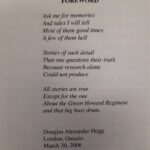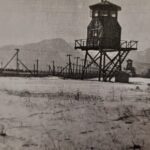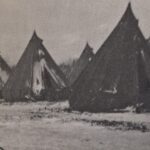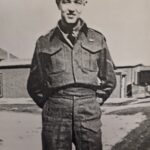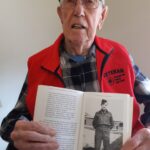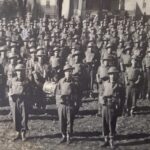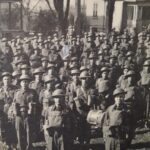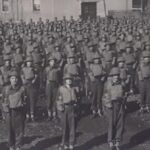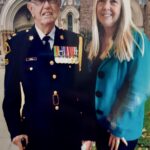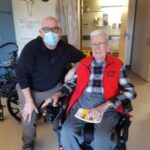Doug Hogg was born March 29, 1925 in London, Ontario. He grew up in that city, mostly against the backdrop of the Great Depression. He remembers that his father worked several jobs to support the family, and that his grandmother was able to contribute as she had a pension, having lost two sons in the Great War. Doug’s own father was a Great War veteran as well: he fought at Sanctuary Wood, and was a POW of the Germans for much of the war. When the clouds of war were gathering again, Doug recalls the aggression of Hitler and Mussolini; that and the early events of the war led him to join the City of London Regiment Reserve when he was 16. When the regiment was activated at the start of the war, Doug and the men were off to basic training in Listowel, where Doug became the regimental bugler. The next step was advanced training at Niagara-on-the-Lake, where one of their duties was to retrieve German POWs in the Brooklyn Navy Yard in NYC. They took those soldiers by train all the way to Alberta, where they were incarcerated at the Ozada Camp. Heading even further west, Doug ended up in Vernon, B.C., and in several locales on the coast, where the men began to practice amphibious training. It turned out that they had been selected for the Aleutian Islands campaign, and they’d be joining American forces to dislodge the Japanese. Their first stop in the Aleutians was at Adak, where they were based and did further training. Doug would take part in the landings on Kiska, and it was here that the American and Canadian forces ran into one another in the fog, creating a “friendly fire” situation. The Japanese had evacuated the island previous to this, so most of the operation ended up being a thorough search of the area. They spent the next six months as an occupation force, dealing with the cold and isolation. By 1944 he had been shipped to Europe, and Doug spent much of 1944 in England, and that’s where he was when VE Day came in 1945. He did volunteer for the Canadian Far Eastern Force and came back to Canada in short order after VE Day, but the atomic bombs of August 1945 obviated that possibility. A few months later he was demobilized, and he took full advantage of the postwar legislation that welcomed the veterans back to Canada, getting his education and a home, and going on to a career in policing and raising his own family. Doug Hogg was interviewed by Scott Masters at the Parkwood Veteran Centre in London, Ontario on March 25, 2023.
Videos
Click next video below to keep watching
